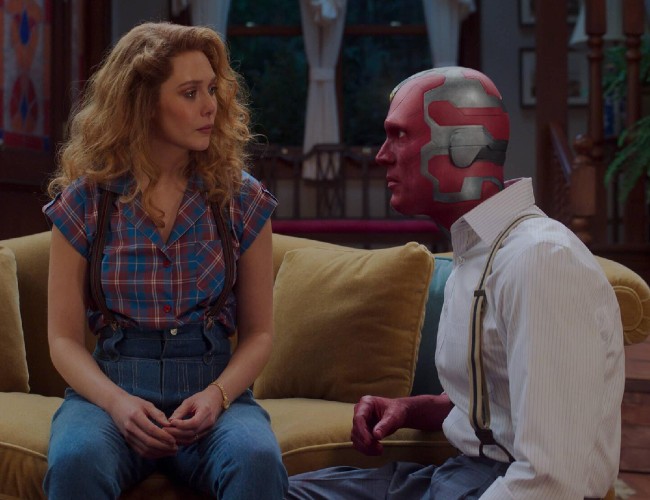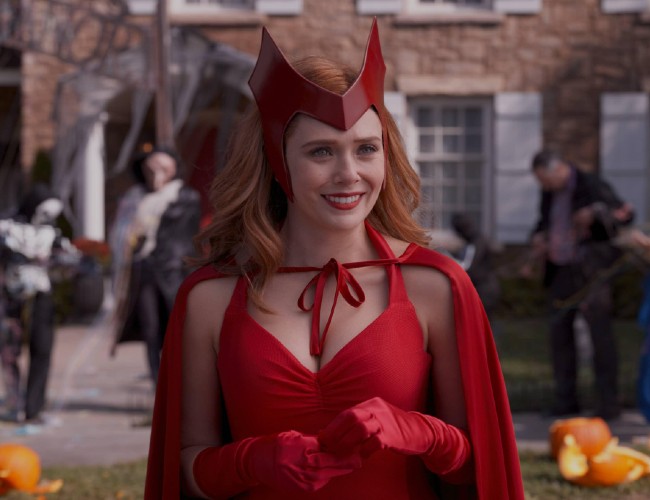SPOILERS AHEAD … AND A TV HOMAGE SOAKED IN GRIEF …
Would you like to see how powerful grief can be?
How it can completely alter the entirety of the landscape of your life, pluck you from good and reason into a maelstrom of senseless and atypical decision-making and the way in which it eats away at the very thing/s you are trying so desperately to preserve?
Then watch WandaVision, and in particular episodes five and six which, after the revelations contained in episodes 3 and 4, take an immensely affecting deep dive into how loss and pain on an overwhelming scale can corrode a person’s sense of right and wrong, of up and down and of where the truth north point of life lies.
“On a Very Special Episode …” and “All-New Halloween Spooktacular!” took us into the world of Wanda Romanoff (Elizabeth Olsen) who has essentially taken all the residents of Westview hostage, controlling their minds and lives so that they act like puppets for her vast grief-stricken fantasy, one in which Vision (Paul Bettany) is alive and well and one of Marvels’ most-loved couples are snug and safe in TV-birthed suburbia, safe from the blisteringly awful aftereffects of Thanos, the Infinity Stones and the Snap.
For all its compelling narrative twists and turns, and they are considerable and mesmerising in a way that TV rarely manages, what really strikes home as the sheer extent of Wandas great grief delusion manifests in all its understandable but horrifically nightmarish majesty, is how grief in all its life-subsuming way, can change everything and everyone.
Wanda is, by any measure, a woman lost in grief.
Her desperate inability to come to terms with Vision, who died when Thanos brutally plucked his consciousness-sustaining Mind Stone, is there for everyone to see, from the people in their thousands who she has trapped in her hellhole of happiness to the government agency workers and military personnel watching from outside the shimmering edges of her creation, and it is heartbreaking to watch because for all its sitcom window-dressed awfulness, it is also entirely, completely understandable.
Grief causes people to behave in irrational and sometimes terrible ways, or at least, in ways not remotely in character, and often without realising fully or at all what they are doing, and all of that is evident in Wanda’s carefully-curated world where the cracks are beginning to loom destructively and alarmingly large.
Chief among those glaring cracks in the facade of domestic, grief-pushing back bliss is Vision’s increasing awareness that something is horrible, terribly wrong.
He has suspected it in small ways for a while now as he witnessed strange and inexplicable things happen, on top of the fact that he has no memory of life before Westview, of what an Avenger is and what the outside world is.
That absence of existential cohesion is bad enough, sufficient to send alarm bells ringing in what passes for his vibranium synthezoid soul, but in “On a Very Special Episode …” and “All-New Halloween Spooktacular!” it becomes unsustainably difficult to bear.
At various times, he is told he is dead (by Agnes, played by Kathryn Hahn, who is at her zany and terrified best throughout), that the people around him are all being mind-controlled by his wife (the terror of loss of self conveyed by Agnes and Norm in Vision-induced moments of lucidity is horrifying to watch) and that everything he knows is all a big, fabricated lie courtesy of his wife who, even when confronted, does not appear to know how it all started nor how she sustains it.
You would think she might, especially after she quite deliberately sent S.W.O.R.D. agent Monica Rambeau (Teyonah Parris) hurtling back through the barrier to the real world where she told waiting government people what was really going on inside the anomaly, and extended the barrier far out from its previous position so that now the government and military personnel are characters in a circus – the visuals when this happens are scary and yet almost heinously comical – that she’d be aware of what she is doing.
And it seems, in some ways, she is; when she is confronted such as by her mysteriously-reappeared brother Pietro (Evan Peters, who is the not the actor who portrayed him in The Avengers film which leads to a few in-jokes) about what it is she is truly doing, she Monicas him, sort of, and pushes him back across the square in which the town, at least the ones Wanda has need then – the rest are stand eerily silent at unnatural points around town, something Vision sees and which understandably unnerves him – a sign that she knows she is playing a twisted version of God in some form.
But then at other times she appears unaware of the true extent of what she’s doing, or at the very least, untouched by its true ramifications including the fact she has imprisoned thousands of people in her quest to hold grief at bay.
There are some truly spectacular moments in these two episodes, including the end of episode 6 in which the head of S.W.O.R.D. Tyler Hayward (Josh Stamberg), who’s in full blow her up and end this all mode (and you know that never ends well), is furiously driving to escape the hexagonal barrier aka “The Hex”‘s outer murderously red edge, and the simultaneous changing of everyone in the government camp into clowns and other performers including Monica, brilliant scientist Darcy (Kat Jennings) and FBI agent Jimmy Woo, all of whom were trying to stop Hayward and help him understand what is truly at work here.
But what makes these epiphanic moments really shine, really rip at your heartstrings, and tear them into little pieces, is the way in which grief and fury at the rampant unfairness of the world suffuses everything.
The creators and producers of WandaVision have produced something totally unique here.
It is, at once, a fey and quirky evocation of the the very best of iconic TV, which we see again in the corny lines the characters utter, the late ’80s/early ’90s sitcom opening credits (a homage in part to Family Ties) which capture the overly-cheesy whimsically-emotive nature of shows of that era, and the larger-than-life nature of just about everything, but it it also a brutally honest deep look into how grief reshapes and remoulds everything and how we are never, ever the same again.
The interesting thing going forward, of course, is that everyone is now deep inside “The Hex”, as Darcy has christened it, and so any change in what happens to Wanda, the people she has hostage (now far greater in number) and the town itself is going to have to happen from the inside.
It’s what Monica was going to attempt before she and everyone else was swallowed by the barrier-swelling action, triggered by the way by the fact that Vision had pushed himself outside the barrier and was dying all over again, something to which Wanda was alerted by her unnaturally fast-growing and superhero-level gifted gifted kids, Tommy and Billy (played by Jett Klyne at 10 years old and Gavin Borders at 5 years old, and Julian Hilliard at 10 years old and Baylen Bielitz at 5 years old) and about which she acted as she has done since she took Vision’s body into her care nine days earlier by doing what she has to keep her delusion intact.
But it will exponentially more difficult now because Wanda maintains a near-impervious hold on the consciousness of the people in Westview so while they know something is wrong, it’s near impossible for them to break out of the sitcom-y characteristics assigned to them.
I imagine though that Monica, who truly understands what grief can do to a person, having just learn her mother died from cancer while her daughter was dusted and lost in the Snap, and who is advocating for Wanda as a person, if not her justifying her actions, and Darcy and Jimmy, will do what they can to break free from her hold and bring some sanity back into proceedings.
For Wanda’s grandly nightmarish experiment in grief conquering, which is, as we’ve witnessed not going so well because the effects of that kind of loss and pain don’t play nice and don’t ever just walk away and play nice, is only going to be broken by the delicate and empathetic exercise of raw humanity and not by missiles and by bravado, all of which means the concluding three episodes will be a dark and affecting deep dive into the human soul, with horror-filled quirky overtones, testament, as the last few episodes have been to grief’s monstrous power but also to how it can be only be bested by slowly, and painfully rejoining the human race, something which always feel far, far worse (and it will for Wanda) before it feels at all better.


